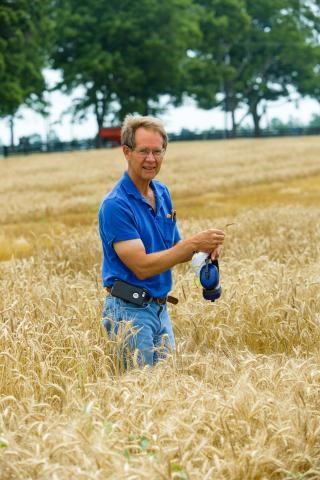David A. Van Sanford

Last Revised: Jan 16th, 2025
Professional Biography
Areas of Interest: Wheat breeding: development of improved cultivars of soft red winter wheat for Kentucky. Specific research foci include the inheritance of resistance to Fusarium head blight, breeding for adaptation to climate change and identification of genetic factors associated with nitrogen use efficiency. The UK Wheat Breeding Project is led by Dr. Van Sanford.
Dr. Van Sanford joined the Plant and Soil Sciences Department in 1981. His research focus is breeding and development of soft red winter wheat varieties for Kentucky and the mid-south. His team is working to breed varieties resistant to Fusarium head blight, a devastating disease of wheat in Kentucky and worldwide. The wheat breeding team also studies the genetic basis of nitrogen utilization in order to breed high-yielding varieties that require less nitrogen fertilizer, as well as the impacts of climate change through warming studies that identify genotypes with resilience to warming. Van Sanford’s team has recently collaborated with a local baker and grower to try and produce high protein bread wheat in central KY in a sustainable manner.
Publications
- Mao Huang, Nafeti Mheni, Gina Brown-Guedira, Anne McKendry, Carl Griffey, David Van Sanford, Jose Costa, Clay Sneller. Genetic analysis of heading date in winter and spring wheat. Euphytica (2018) 214:128.
- Tessmann, Elisane W., and David A. Van Sanford. GWAS for Fusarium Head Blight Related Traits in Winter Wheat (Triticum Aestivum L.) in an Artificially Warmed Treatment. Agronomy 2018, 8, 68; doi:10.3390/agronomy8050068.
- Huang, M., B. Ward, C. Griffey, D. Van Sanford, A. McKendry, G. Brown-Guedira, P. Tyagi, and C. Sneller. 2018. The Accuracy of Genomic Prediction between Environments and Populations for Soft Wheat Traits. Crop Sci. 0. doi:10.2135/cropsci2017.10.0638.
- Russell, Kathleen, David A. Van Sanford. Breeding for resilience to increasing temperatures: A field trial assessing genetic variation in soft red winter wheat. Ecology and Evolution. 2018;1–11. DOI: 10.1002/ece3.4668.
- Van Sanford, David A., Anthony J. Clark, Carl Bradley, Gina L. Brown-Guedira, Christina Cowger,Yanhong Dong, and Byung-Kee Baik. Registration of ‘Pembroke 2016’ Soft Red Winter Wheat. Journal of Plant Registrations. doi:10.3198/jpr2017.12.0089crc.
- Russell, Kathleen, Chad Lee, and David Van Sanford. Interaction of Genetics, Environment, and Management in Determining Soft Red Winter Wheat Yields. Agron. J. 109:2463–2473 (2017) doi:10.2134/agronj2017.02.0126.
- Van Sanford, David A., Anthony J. Clark, Don Hershman, Gina L. Brown-Guedira, Christina Cowger, Yanhong Dong, and Byung-Kee Baik. Registration of ‘Pembroke 2014’ Soft Red Winter Wheat. Journal of Plant Registrations 10:41–46 (2016). doi:10.3198/jpr2015.07.0045crc.
- Islam, Md. Sariful, Gina Brown-Guedira, David Van Sanford, Herb Ohm, Yanhong Dong, Anne L. McKendry. Novel QTL associated with the Fusarium head blight resistance in Truman soft red winter wheat. Euphytica (2016) 207:571–592. DOI 10.1007/s10681-015-1550-9.
- Clark, Anthony J., Daniela Sarti-Dvorjak, Gina Brown-Guedira, Yanhong Dong, Byung-Kee Baik and David A. VanSanford. Identifying Rare FHB-Resistant Segregants in Intransigent Backcross and F2 Winter Wheat Populations. Frontiers in Microbiology, 7:277. doi: 10.3389/fmicb.2016.00277.
- Hitz, Katlyn, Anthony J. Clark, David A. Van Sanford. Identifying nitrogen-use efficient soft red winter wheat lines in high and low nitrogen environments. Field Crops Research 200 (2016) 1–9.
- Clark, Anthony J., Jose M. Costa, Carl A. Griffey, Gina L. Brown-Guedira, Yanhong Dong, Edward J. Souza, J. Paul Murphy and David A. Van Sanford. 2014. Registration of Scab-Resistant KY06C-11-3-10 Soft Red Winter Wheat Germplasm. Journal of Plant Registrations 8: 211-216.
- Balut, Ana L., Anthony J. Clark, Gina Brown-Guedira, Edward Souza, and David A. Van Sanford . 2013. Validation of Fhb1 and Qfhs.Nau-2DL in Several Soft Red Winter Wheat Populations. Crop Sci. 53: 934-945.
Awards
- University of Kentucky Research Professorship Award, 2018-2019
- Thomas Poe Cooper Award for distinguished achievement in research from the University of Kentucky College of Agriculture, Food and Environment, 2014
- Fellow of the American Society of Agronomy and the Crop Science Society of America, 2011
Recent Cultivar and Germplasm Releases
Pembroke 2014 is an early maturing, semi-dwarf soft red winter wheat cultivar with resistance to Fusarium head blight, high yield potential, excellent test weight and resistance to lodging. Pembroke 2014 was released directly to the Kentucky Small Grain Growers Association for production and marketing.
Pembroke 2016 is also early, heading about 1 day later than Pembroke 2014 and short statured, though its lodging resistance under high nitrogen is not as pronounced as Pembroke 2014. In high yield environments, it has higher yield potential than Pembroke 2014 with only slightly lower test weight. Pembroke 2016 also has moderate FHB resistance, and like Pembroke 2014, the resistance comes from the major effect QTL Fhb1. Pembroke 2016 was released directly to the Kentucky Small Grain Growers Association for production and marketing.
KY06C-11-3-10 scab resistant soft red winter wheat germplasm (Reg. No. GP-965, PI 669817), that combines three exotic QTL and native resistance in a well-adapted (‘McCormick’) background. It was developed through marker-assisted backcrossing.
Graduate Research & Alumni
Current Students
- Virginia Verges, Ph.D. Candidate: Research project includes generating different genomic selection schemes and evaluating their effectiveness in wheat breeding. Different traits being studied are yield, agronomic traits and disease resistance.
- Elisane Weber Tessman, Ph.D. Candidate: Primary research objective is to identify potential QTL for morphological and scab traits for FHB resistance as well as to assess the effects of temperature on disease pressure.
- Jesse Carmack, Ph.D. Research Assistant: Research project includes using recurrent mass selection to enhance head scab resistance in soft red winter wheat.
Alumni
- Kathleen Russell, Ph.D., 2016: Current position: Manager of the Southwestern Colorado Research Center (Colorado State University) located in Yellow Jacket, CO.
- Katlyn Hitz, M.S., May 2015: Current position: Barley Research Specialist, Miller-Coors, Idaho.
- Daniela Sarti-Dvorjak, Ph.D., May 2013: Current position: Soybean Breeder, Syngenta Seeds, Iowa.
- Ana Balut, M.S., May 2012: Current position: Inbred line increase manager, Monsanto, Argentina.
Education
Course Instruction
Term(s) Taught:
Term(s) Taught:
Term(s) Taught:
